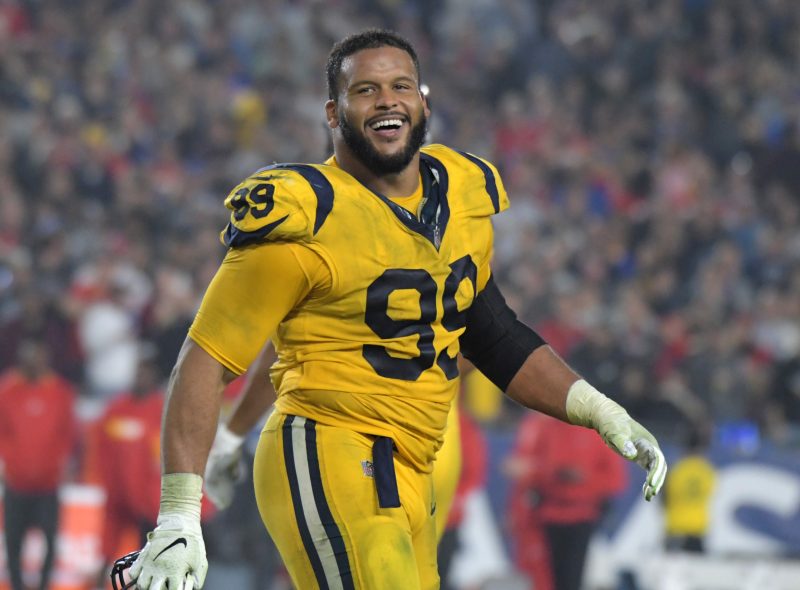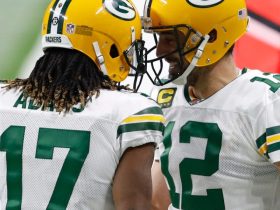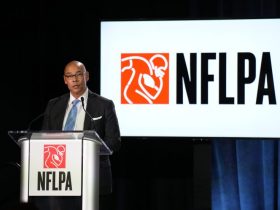Aaron Donald changed the NFL.
There’s really no other way to encapsulate the Los Angeles Rams’ superstar defensive lineman, who stunned the league Friday with the announcement that he was retiring at age 32 after 10 seasons. Three-time league Defensive Player of the Year, tied for most ever with Lawrence Taylor and J.J. Watt? Insufficient. Eight-time first-team All-Pro, tied for most ever among defenders since the AFL and NFL merged in 1970 (and in far fewer seasons than Hall of Famers Taylor, Bruce Smith or Reggie White)? Insufficient. A Pro Bowler in all 10 of his professional campaigns? Insufficient. A Super Bowl champion, one who provided the decisive pressure on the penultimate play against the Cincinnati Bengals two years ago to secure victory and the Lombardi Trophy? Insufficient. Thousands of double teams faced? Insufficient.
But you’re doubtless getting the picture if you hadn’t regarded it already. The Arizona Cardinals’ Kyler Murray tidily summed up the quarterback community’s reaction to Donald’s departure with a two-word tweet: “THANK GOD.”
Over the past decade, there almost certainly hasn’t been a better NFL player than AD99. Patrick Mahomes? Sure, the three-time Super Bowl MVP has a valid argument. But among other non-quarterbacks? No way. And when considering the history of a league that’s more than a century old, Donald should legitimately be in the argument as a Mount Rushmore candidate and most certainly in the discussion with the likes of Taylor, White or Deacon Jones as the best defender who ever lived.
It’s never easy to quantify the value of a man who spends his life toiling in the trenches. Yet it’s actually not difficult in Donald’s case given a career that included 111 sacks – second-most in league annals among defensive tackles after Hall of Famer John Randle (137½ in 14 seasons) since the stat became official in 1982 – 176 tackles for loss (third-most ever), 790 pressures, 256 quarterback hits and 24 forced fumbles.
NFL STATS CENTRAL: The latest NFL scores, schedules, odds, stats and more.
But, again, the numbers don’t do him justice.
“The great players in our league elevate the people around them and Aaron has modeled the way for our team as long as I’ve been with the Rams,” Rams head coach Sean McVay said in a statement. “He’s an elite competitor, someone who leads by example in a way that’s authentic to him, and an exceptional teammate who inspires everyone around him to be the best version of themselves.”
Donald was a true outlier when he entered the league in 2014 as the 13th overall draft pick out of the University of Pittsburgh – one made by the St. Louis Rams. At 6-1, 280 pounds, he didn’t look like the prototypical interior lineman. Too short. Too light. Probably wouldn’t hold up against the run. Likely to get engulfed by hulking blockers.
Whatever.
Donald quickly made his mark as the Defensive Rookie of the Year with nine sacks. The following season, he had 11 – and 37 quarterback hits, trailing only Watt but nearly double the next defensive tackle. Donald was too quick, too powerful and employed those traits as leverage against offensive linemen who quickly learned they couldn’t deal with him one-on-one.
After 2015, his talent was regularly showcased on a national stage with the Rams relocating back to Los Angeles and becoming perennial playoff threats under McVay, who was hired in 2017. Donald also became an archetype for NFL teams seeking interior pass rushers – not that there was ever even a reasonable facsimile. As Donald charted the quickest path to quarterbacks from the A and B gaps, other clubs had to rotate in underpowered defensive ends on passing downs to try and replicate his success – which proved the best antidote for defenses as offenses increasingly deployed three- and four-receiver sets, relying more heavily on quick-trigger passing games and spread concepts that didn’t grant traditional pass rushers sufficient time to affect quarterbacks.
Since NFL Network began polling players in 2011 to rank their top 100 peers on an annual basis, Donald and Watt are the only defensive players ever recognized as No. 1.
The crowning achievement finally arrived in Super Bowl 56 – appropriately played in Los Angeles’ SoFi Stadium to cap the 2021 season – Donald putting a bow on what had already been a banner two-sack day by ragdolling Bengals quarterback Joe Burrow on a last-gasp, fourth-down throw to ice the Rams’ first ice as Hollywood tenants.
Also, allow me to contradict myself for a second here: Some numbers do do Donald justice. This year’s free agency market, which saw defensive tackles Chris Jones and Christian Wilkins earn $100+ million contracts averaging more than $25 million annually – and the Baltimore Ravens’ Justin Madubuike wasn’t far behind – speaks to how NFL organizations now value interior D-linemen. Even guards who are suddenly getting $20 million or more per season to try to deal with these monsters have benefited from the altered landscape.
That’s the Donald Effect – and, for current players, by the most important metric.
As he exits stage left to focus on family and seek a new path, it’s natural to wonder what such a durable and prolific player might have done over the course of 15 seasons. But leaving on top also feels appropriate for a man who’s already a mythical character in NFL lore – one certain to don a gold Hall of Fame jacket when he’s first eligible in 2029.
“There will never be another Aaron Donald,” said Rams general manager Les Snead on Friday.
That pretty well sums it up.
***
Follow USA TODAY Sports’ Nate Davis on X, formerly Twitter @ByNateDavis.






